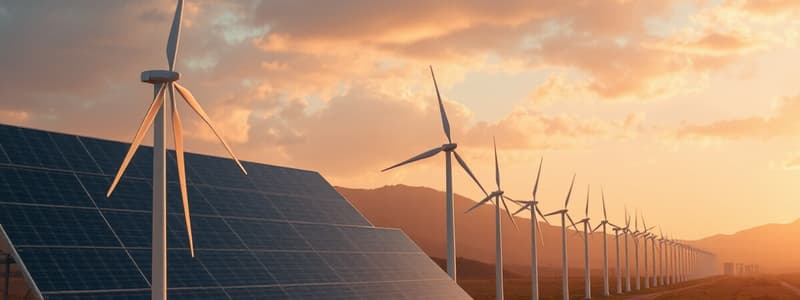Podcast
Questions and Answers
What is energy?
What is energy?
- A source of heat only
- A form of fossil fuel
- The ability to create matter
- Power that may be translated into motion (correct)
Define renewable energy.
Define renewable energy.
Any naturally occurring, theoretically inexhaustible source of energy.
What classifies an energy source as nonrenewable?
What classifies an energy source as nonrenewable?
If they cannot be replenished in a short period of time.
What are fossil fuels?
What are fossil fuels?
What is coal?
What is coal?
What is oil?
What is oil?
What is natural gas?
What is natural gas?
Define reserve in the context of fossil fuels.
Define reserve in the context of fossil fuels.
What does it mean to conserve natural resources?
What does it mean to conserve natural resources?
What is nuclear energy?
What is nuclear energy?
What is nuclear fusion?
What is nuclear fusion?
What is nuclear fission?
What is nuclear fission?
What is solar energy?
What is solar energy?
What is wind energy?
What is wind energy?
What is hydro energy?
What is hydro energy?
What is geothermal energy?
What is geothermal energy?
What is biomass energy?
What is biomass energy?
Study Notes
Energy Overview
- Energy is the capacity to do work, existing in various forms including thermal, electrical, mechanical, chemical, radiant, and kinetic.
- Conversion of energy allows it to change from one form to another during work processes.
Renewable Energy
- Renewable energy sources are inexhaustible and naturally replenished, e.g., solar, wind, tidal, wave, hydroelectric power, and biomass.
- These sources can be renewed by natural processes within approximately 100 years.
Nonrenewable Energy
- Nonrenewable energy sources cannot be replenished quickly; they take millions of years to form.
- These resources are typically extracted in solid, liquid, or gas forms.
Fossil Fuels
- Fossil fuels, including coal, oil, and natural gas, are derived from ancient organisms' remains subjected to heat and pressure.
- They are a significant nonrenewable energy source due to their long formation time.
Coal
- Coal is the most abundant fossil fuel, made up of at least 50% plant remains.
- Classified by carbon concentration levels into Peat, Lignite, Bituminous, and Anthracite.
Oil
- Oil is a viscous black liquid formed from marine organisms' remains, classified as a hydrocarbon.
Natural Gas
- Natural gas is a gaseous hydrocarbon that also originates from marine organisms' remains.
Energy Reserves
- Reserves denote the quantity of fossil fuel extractable at a profit with current technology.
Resources
- Resources serve as supply sources that can be utilized when necessary, offering support or assistance.
Conservation
- Conservation involves the wise management of natural resources to preserve and save them for future use.
Nuclear Energy
- Nuclear energy is generated through atomic reactions and serves as an alternative energy source.
Nuclear Fusion
- Nuclear fusion combines low-mass materials to create a substance of greater mass.
Nuclear Fission
- Nuclear fission involves splitting the heavy elements' nucleus (typically Uranium-235) to release energy, producing radioactive waste.
Solar Energy
- Solar energy harnesses heat and electricity directly from sunlight.
Wind Energy
- Wind energy is harvested from wind motion and can be used for transportation, electricity generation, and pumping water.
Hydro Energy
- Hydro energy utilizes flowing water to generate electricity.
Geothermal Energy
- Geothermal energy is derived from hot magma or dry rocks within the Earth's crust.
Biomass Energy
- Biomass energy comes from burning organic materials like wood, alcohol, and waste products.
Studying That Suits You
Use AI to generate personalized quizzes and flashcards to suit your learning preferences.
Description
Test your knowledge on energy resources with this flashcard quiz. Explore definitions and differences between renewable and nonrenewable energy sources. Perfect for students looking to deepen their understanding of this crucial topic.




